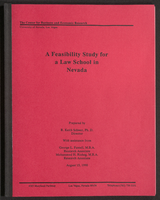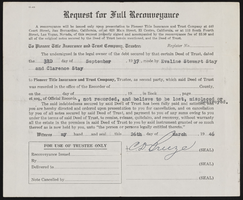Search the Special Collections and Archives Portal
Search Results

Interview with Harrie Fox Hess, March 5, 2005
Date
Archival Collection
Description
Text

Dr. Alvaro Vergara-Mery oral history interview: transcript
Date
Archival Collection
Description
Oral history interview with Dr. Alvaro Vergara-Mery conducted by Barbara Tabach on October 28, 2020 for the Latinx Voices of Southern Nevada Oral History Project. Alvaro discusses his personal history and his upbringing in both Chile and the United Kingdom before immigrating to the United States; due to political unrest in Chile, he moved to the U.K. where his mother was born before attending university in the United States. Alvaro talks about his work as a medical interpreter for University Medical Center (UMC) as well as his college teaching experience at University of Nevada Las Vegas and California State Berkley.
Text

A Feasibility Study for a Law School in Nevada (bound)
Date
Archival Collection
Description
A bound version of "A Feasibility Study for a Law School in Nevada" prepared by R. Keith Schwer, Ph. D., Director, with assistance from George L. Fussell, M.B.A., Research Associate, and Mohammed H. Risheg, M.B.A., Research Associate, The Center for Business and Economic Research, University of Nevada, Las Vegas. From the University of Nevada, Las Vegas William S. Boyd School of Law Records (UA-00048).
Text

Catherine Cortez Masto oral history interview: transcript
Date
Archival Collection
Description
Oral history interview with Catherine Cortez Masto conducted by Claytee D. White on August 10, 2018 for the Latinx Voices of Southern Nevada Oral History Project. Catherine Cortez Masto grew up in Las Vegas near where the town ended and the desert began, which at that time was near Decatur and Pennwood. She grew up playing in the streets and riding horses and motor bikes with girlfriends and cousins. Her father, Manny Cortez, began as a valet at the Dunes before entering politics. He served 16 years on the County Commission and then 13 years as the chief of the Las Vegas Convention and Visitors Authority. As the head of the LVCVA, Manny oversaw campaigns to increase tourism, enlarge McCarran International Airport, improve taxicab service, and served as a visionary for the entire region. Catherine followed in her father's footsteps while being her own woman and making her own mark on the region. She attended college at UNR and law school at Gonzaga University School of Law. After a clerkship, she worked for a small local Las Vegas firm for 4 - 5 years, then moved to the governor's and then served two terms as Nevada's Attorney General. Currently she's in the US Senate with committee assignments that include Banking, Housing and Urban Affairs; Energy and Natural Resources; Commerce, Science, and Transportation; Rules and Administration; Indian Affairs, and the Committee on Aging. Subjects discussed include: Dunes, Manny Cortez, County Commission, LVCVA, Judge Carl Christensen, Judge Mendoza, Taxi Authority, Tourism, and Mike O'Callaghan.
Text

Transcript of interview with Juanita Kilburg by Vincente C. Camacho, March 7, 1981
Date
Archival Collection
Description
On March 7, 1981, Vicente C. Camacho interviewed accounting clerk, Juanita Kilburg (born September 25th, 1923 in Los Angeles, California) on the second floor of the UNLV Dickinson Library. Kilburg explains how her family first moved to Southern Nevada and her father’s ties to the railroad. She then goes on to explain the growth of the military and Nellis Air Force Base. The interview concludes with a discussion on her work with the American Legion service organization.
Text

Transcript of interview of Thalia Dondero by Mary Germain, March 13, 1976
Date
Archival Collection
Description
On March 13, 1976, Mary Germain interviewed Thalia Dondero (born 1921 in Greeley, Colorado) about her life in Nevada and her experiences as the first female commissioner for the Clark County Commission. Dondero first talks about her upbringing and her eventual move to Southern Nevada. She also discusses her involvement in extracurricular activities, such as being a leader for the Girl Scouts, and how some of those experiences led her to get involved in politics. Dondero also mentions her work with National Geographic and her passion for working with oil paintings and watercolors. The final part of the interview involves some of Dondero’s accounts as a commissioner for Clark County and some of the challenges she has faced in that position.
Text

Transcript of interview with Bob Campagna by Kathleen Neumann, March 17, 1978
Date
Archival Collection
Description
Text

Transcript of interview with Linda Hartley by Pauline Marchese, March 10, 1978
Date
Archival Collection
Description
On March 10, 1978, Pauline Marchese interviewed her neighbor, Linda Hartley (born in 1941, in Cedar City, Utah) in her home at 5261 South Jane Way, Las Vegas, Nevada. During the interview, the two discuss Hartley’s personal history, such as schools that she had attended and her recollection of local recreational activities. The two go on to talk about changes in crime, the environment, and briefly discuss a variety of issues at the time, including: segregated schools, prostitution, and effects of the Nevada Test Site.
Text

Interview with Wendell D. Weart, April 18, 2006
Date
Archival Collection
Description
Text

Evaline Stewart Stay estate legal documents and notes
Date
Archival Collection
Description
Evaline Stewart Stay estate legal documents and notes
Text
